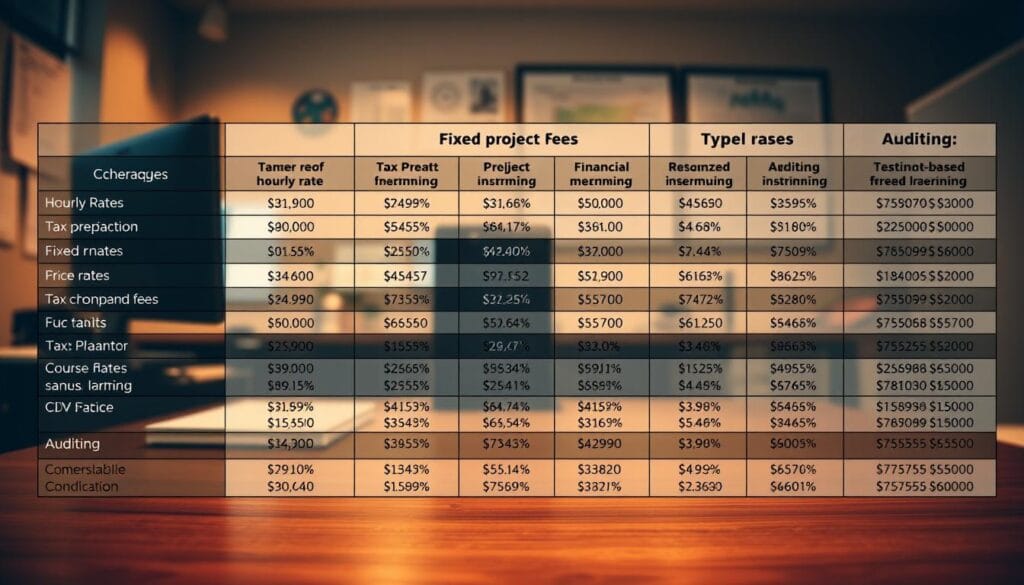Did you know that over 60% of taxpayers feel overwhelmed by the complexity of tax laws? As we approach 2025, the role of Certified Public Accountants (CPAs) has become more critical than ever. With tax regulations growing increasingly intricate, professional guidance is no longer a luxury—it’s a necessity.
CPAs offer more than just tax preparation. They provide strategic financial planning, ensuring compliance while optimizing your financial health. According to the IRS, CPAs hold unlimited representation rights, meaning they can represent clients in audits, appeals, and other tax-related matters. This level of expertise is invaluable in navigating the ever-changing tax landscape.
Choosing the right professional can make a significant difference. Fees vary based on the complexity of your return, with averages ranging from $319 to $521. For those seeking reliable support, exploring options like tax filing software can also complement professional services.
Key Takeaways
- Tax laws are becoming more complex, increasing the need for professional guidance.
- CPAs offer unlimited representation rights during audits and appeals.
- Average fees for CPA services range from $319 to $521, depending on return complexity.
- Strategic financial planning is a key benefit of working with a CPA.
- Combining professional services with tax filing software can enhance efficiency.
What Are CPA Services for Taxes?

Tax preparation can be a daunting task, but understanding the role of a CPA can simplify the process. Certified Public Accountants (CPAs) are highly trained professionals who specialize in managing tax returns and ensuring compliance with ever-changing tax laws. Their expertise goes beyond basic filing, offering strategic financial planning and representation during audits or appeals.
Understanding the Role of a CPA
Becoming a CPA requires rigorous training and certification. Candidates must complete over 150 semester hours of education, pass the four-part Uniform CPA Exam, and log 1,800 hours of supervised work experience. Additionally, CPAs must maintain 72 hours of continuing education every three years to stay updated on tax laws and accounting practices.
This extensive training ensures that CPAs are well-equipped to handle complex financial situations. Unlike other tax preparers, CPAs hold unlimited representation rights, allowing them to represent clients in all matters before the IRS. This makes them invaluable for individuals and businesses navigating intricate tax scenarios.
How CPAs Differ from Other Tax Preparers
While enrolled agents and other tax professionals can assist with tax preparation, CPAs stand out due to their comprehensive education and licensing requirements. For example, enrolled agents must pass the Special Enrollment Exam but do not need the same level of accounting education as CPAs.
Another key difference lies in representation rights. CPAs can represent clients in audits, appeals, and payment negotiations, whereas participants in the Annual Filing Season Program (AFSP) have limited rights. Additionally, CPAs are prohibited from charging percentage-based fees on refunds, ensuring transparency and ethical practices.
For those planning for the future, combining CPA services with retirement planning tools can provide a holistic approach to financial health. Whether you’re managing personal finances or running a business, CPAs offer the expertise needed to navigate the complexities of tax preparation with confidence.
Why Choose CPA Services for Your Taxes?

Tax season often brings stress, but expert support can ease the burden. A 2023 Drake Software survey revealed that 23% of self-prepared returns contain errors. These mistakes can lead to penalties or missed opportunities for savings. Professional tax experts, on the other hand, ensure accuracy and compliance while maximizing your financial benefits.
Expert Knowledge of Tax Laws
Tax laws are constantly evolving, making it challenging for individuals to stay updated. For instance, the SECURE 2.0 Act introduced significant changes to retirement account taxation. Professionals are well-versed in these updates, ensuring your filings align with the latest regulations.
Cryptocurrency reporting is another area where expertise is crucial. Under 2025 IRS guidelines, digital assets must be reported accurately. Missteps in this area can trigger audits or penalties. Professional tax preparers navigate these complexities with ease.
Maximizing Deductions and Credits
An AICPA study found that professionals identify 42% more eligible credits than DIY filers. This includes optimizing R&D tax credits for small businesses and conducting cost segregation studies for rental property owners. These strategies can significantly reduce your tax liability.
Additionally, NerdWallet statistics show that CPA-prepared returns have a lower audit risk. This peace of mind is invaluable during tax season. Whether you’re managing personal finances or running a business, professional tax assistance ensures you’re maximizing every opportunity.
Best CPA Services for Taxes in 2025

In 2025, the tax preparation landscape is evolving rapidly, with innovative solutions leading the way. Businesses and individuals alike are seeking reliable support to navigate complex tax obligations. This has led to the rise of advanced tools and expert guidance, transforming how taxes are managed.
Top Firms to Consider
Several firms are setting new standards in the industry. SK Financial CPA, for instance, offers free initial consultations, making it easier for clients to assess their needs. TurboTax Live Full Service guarantees 100% accuracy, providing peace of mind during tax season.
National firms with 2025 innovation awards are also worth noting. These organizations leverage cutting-edge technology to streamline workflows and enhance accuracy. Boutique firms, on the other hand, specialize in niche industries, offering tailored solutions for unique challenges.
What Makes These Solutions Stand Out
One key differentiator is the integration of AI into tax workflow platforms. This technology reduces errors and speeds up the preparation process. Additionally, many firms now hold cybersecurity certifications, such as SOC 2 Type II compliance, ensuring client data remains secure.
Multilingual support teams are another standout feature, catering to global filers with diverse needs. For those looking to optimize their financial strategies, combining these services with low-fee robo-advisors can provide a comprehensive approach to financial health.
Relying on skilled tax professionals ensures compliance while maximizing deductions and credits. Whether you’re managing personal finances or running a business, these solutions offer the expertise needed to navigate the complexities of tax preparation with confidence.
How CPAs Can Help with Tax Planning

Navigating the complexities of tax planning requires more than just annual preparation. It involves proactive strategies to ensure compliance and optimize financial outcomes. With 68% of professionals now offering quarterly tax health checks, staying ahead of obligations has never been easier.
Year-Round Tax Strategies
Effective tax planning is a year-round process. For instance, crypto tax loss harvesting can save an average of $2,812 annually. This strategy involves selling digital assets at a loss to offset gains, reducing overall liability.
Another approach is the Roth conversion ladder, which benefits early retirees by minimizing taxes on retirement withdrawals. Additionally, optimizing the cost basis for Employee Stock Purchase Plan (ESPP) sales can lead to significant savings.
Navigating Complex Tax Situations
For businesses, controlled foreign corporation reporting is a critical area. Properly managing these requirements ensures compliance and avoids penalties. Similarly, cross-state nexus evaluations are essential for remote workers, as tax obligations vary by location.
ERC claim audits are another area where professionals provide valuable support. They help mitigate risks by ensuring accurate documentation and adherence to guidelines. Combining these strategies with retirement planning tools offers a comprehensive approach to financial health.
Structured tax planning not only ensures compliance but also maximizes opportunities like the income tax credit. Whether you’re managing personal finances or running a business, professional guidance is essential for navigating complex scenarios with confidence.
Finding the Right CPA for Your Needs

With over 342,000 verified preparers in the IRS Directory, finding the right professional can seem overwhelming1. The key is to focus on credentials, experience, and the specific services that align with your needs. Whether you’re an individual or a business, selecting the right tax preparer ensures compliance and maximizes financial benefits.
Where to Look for CPA Services
State CPA societies maintain databases specific to their jurisdiction, offering authoritative information on licensed professionals1. These databases are publicly accessible and provide the most accurate and up-to-date licensing status. Commercial platforms, while broader in scope, may lack the same level of reliability.
Blockchain technology is also transforming credential verification. It enhances security and transparency, ensuring credentials are tamper-proof2. However, challenges like credential proliferation and infrastructure requirements must be addressed for widespread adoption.
Questions to Ask Before Hiring a CPA
When evaluating a tax preparer, ask about their access to blockchain audit trails and AI reconciliation tools. These technologies streamline verification and improve accuracy3. Additionally, verify their Preparer Tax Identification Number (PTIN) through the IRS Tax Pro Account portal to ensure compliance4.
Checking FINRA BrokerCheck for disciplinary history is another essential step. This tool provides detailed information on a professional’s background, promoting transparency and trust5. Combining these strategies with tools like robo-advisors can enhance your financial planning.
Verifying CPA Credentials and Experience

Ensuring your tax preparer’s credentials are up-to-date is a critical step in safeguarding your financial interests. With over 12 million license checks processed annually through NASBA’s CPA Verify tool, verifying a professional’s qualifications has never been easier. This process ensures compliance with state-specific requirements and provides peace of mind.
Checking Licenses and PTINs
Licensing is a cornerstone of a CPA’s credibility. Each state has unique requirements, such as New York’s 4,000-hour rule for practical experience. Additionally, CPAs must hold a valid Preparer Tax Identification Number (PTIN), which can be verified through the IRS Tax Pro Account portal.
Red flags to watch for include lapsed PTINs or missing AICPA membership. These issues can indicate a lack of compliance with ethical and professional standards. Always double-check these details before hiring a professional.
Understanding CPA Insurance and Liability
Insurance is another critical factor when selecting a CPA. Top firms often carry Errors and Omissions (E&O) coverage of $5 million or more. This protects clients in case of professional mistakes. Cyber liability policies are also essential, safeguarding sensitive financial data from breaches.
The Enron-era reforms highlight the importance of robust liability policies. These changes have shaped modern standards, ensuring greater accountability and transparency in the profession.
By verifying credentials and understanding insurance policies, you can confidently choose a professional who meets your needs. This diligence ensures compliance and maximizes your financial outcomes.
Understanding CPA Fee Structures

Understanding how professionals charge for their expertise can help you budget effectively. Whether you’re filing a simple Form 1040 return or managing complex business taxes, knowing the fee structure is crucial. This ensures you’re prepared for the financial commitment and can avoid unexpected costs.
Flat Fees vs. Hourly Rates
Professionals often charge either flat fees or hourly rates. Flat fees are common for straightforward tasks like filing a Form 1040 return, averaging $425 in 2025. This model provides clarity, as you know the total cost upfront.
Hourly rates, on the other hand, are typically used for complex cases. For example, filing a Schedule C for small businesses averages $1,200. This approach allows flexibility but can lead to higher costs if the work takes longer than expected.
What to Expect in Terms of Costs
Costs vary based on the complexity of your tax situation. Simple returns may cost as little as $200, while complex filings like Form 1065 for partnerships can reach $2,500. Subscription pricing is also gaining popularity, with 78% of firms offering this option in 2025.
Hidden costs, such as e-filing fees or amendment charges, can add up. It’s essential to ask about these upfront. Payment plans under the IRS Fresh Start program can also ease the burden, making professional assistance more accessible.
For those looking to manage expenses, combining professional services with AI-powered expense tracking tools can provide a comprehensive financial strategy.
Benefits of Using CPA Services for Tax Filing

The right support can transform tax filing from a stressful task into a streamlined experience. Professional guidance ensures accuracy, compliance, and peace of mind, making it a valuable investment for individuals and businesses alike.
Accuracy and Compliance
CPA-prepared returns have a 0.5% error rate, compared to 7% for DIY filings. This precision minimizes the risk of penalties and ensures compliance with IRS regulations. Modern tax software used by professionals includes ID theft protection measures, safeguarding sensitive information with 256-bit encryption.
Additionally, professionals can extend the statute of limitations for certain filings, providing extra time to address complex issues. Their expertise also ensures accurate reporting of items like the tax credit student, maximizing your refund potential.
Audit Support and Representation
Audit likelihood drops by 83% when a professional represents you. CPAs provide robust audit defense protocols, including ERC audit support, to protect your interests. They also advocate for penalty abatement, achieving high success rates in reducing or eliminating fines.
Secure document portals further enhance the process, allowing clients to share sensitive information safely. With their tax planning expertise, professionals ensure you’re prepared for any audit scenario.
When to Use a CPA for Your Taxes
Navigating the complexities of tax obligations often requires more than just basic knowledge. Whether you’re managing a business or dealing with personal finances, certain situations demand professional expertise. A CPA can provide the guidance needed to ensure compliance and optimize your financial outcomes.
Complex Financial Situations
Handling intricate financial scenarios is a key area where CPAs excel. For instance, 89% of Series 7 license holders rely on CPAs for their tax needs. This includes reporting SEC Rule 144 stock sales, which can be a daunting task without professional help.
Another complex area is foreign account oversight. Failure to file FBAR reports can result in severe penalties. CPAs ensure accurate reporting and compliance, minimizing risks. Additionally, NFT sales now trigger filing requirements in 42 states, adding another layer of complexity.
Life Events That Require Professional Help
Major life changes often come with significant tax implications. Divorce, for example, involves allocating assets and liabilities, which can be challenging without expert guidance. CPAs help navigate these situations, ensuring fair and compliant outcomes.
Non-resident alien tax treaty elections are another area where professional help is crucial. Missteps here can lead to unnecessary liabilities. Similarly, conservation easement audits require precise documentation, which CPAs are trained to handle.
For those with student loan interest, CPAs can identify deductions and credits that might otherwise be overlooked. This ensures you’re maximizing your financial benefits while staying compliant with IRS regulations.
Comparing CPA Services to Other Tax Preparers
When it comes to managing tax obligations, understanding the differences between professionals can make all the difference. Tax preparers come in various forms, each with unique qualifications and expertise. This section explores how CPAs compare to Enrolled Agents and tax attorneys, helping you make an informed decision.
CPAs vs. Enrolled Agents
Enrolled Agents (EAs) and CPAs both play vital roles in tax preparation, but their qualifications and scope differ. EAs average 23 years of experience, compared to 17 for CPAs6. This experience often translates into specialized knowledge of federal tax laws and IRS procedures.
One key distinction lies in representation rights. Both CPAs and EAs can represent clients in U.S. Tax Court, ensuring no qualified professional is denied admission based on their background6. However, the EA exam has a pass rate of 70-80%, higher than the CPA exam’s 50%7. This suggests the EA exam may be less challenging due to its narrower focus.
For those considering tax professionals, it’s essential to verify their Preparer Tax Identification Number (PTIN). The IRS requires all preparers to undergo a suitability check, ensuring compliance with ethical standards8.
CPAs vs. Tax Attorneys
Tax attorneys bring a legal perspective to tax matters, often charging 35% more for audit defense6. While CPAs focus on accounting principles, attorneys specialize in tax law, offering in-depth knowledge of regulations and policies.
An LLM in Taxation provides advanced legal expertise, but the CPA credential is recognized internationally, making it more cost-effective for global tax matters7. This broader recognition allows CPAs to handle diverse financial scenarios with confidence.
Ultimately, the choice between these professionals depends on your specific needs. Whether you require legal expertise or comprehensive financial guidance, understanding these differences ensures you select the right preparer for your situation.
Conclusion
Selecting the right professional for your tax needs in 2025 requires careful consideration of key factors. Accuracy, compliance, and audit defense are critical priorities. Professionals reduce audit risks by 83%, ensuring peace of mind during tax season.
Investing in expert preparation often yields significant benefits. While costs vary, the value of maximizing deductions and avoiding penalties outweighs the expense. Verify credentials through tools like the IRS Tax Pro Account portal to ensure reliability.
Looking ahead, 2026 will bring changes to standard deductions. Staying informed and working with trusted professionals ensures you’re prepared. For a holistic financial strategy, consider combining expert guidance with robo-advisors for 2025.
FAQ
What are CPA services for taxes?
How do CPAs differ from other tax preparers?
Why should I choose CPA services for my taxes?
How can CPAs assist with tax planning?
What should I look for when hiring a CPA?
What are the benefits of using CPA services for tax filing?
When should I consider using a CPA for my taxes?
How do CPA fees typically work?
How do CPAs compare to enrolled agents or tax attorneys?
How can I verify a CPA’s credentials?
Source Links
- https://www.aicpa.org/
- https://www.coindesk.com/markets/2020/07/10/blockchain-tech-can-verify-credentials-but-beware-credentialism
- https://www.linkedin.com/advice/3/what-benefits-challenges-using-blockchain
- https://www.irs.gov/tax-professionals/ptin-requirements-for-tax-return-preparers
- https://brokercheck.finra.org/
- https://www.law.cornell.edu/uscode/text/26/7452
- https://www.myaccountingcourse.com/cpa-exam-vs-ea-exam
- https://www.irs.gov/tax-professionals/ptin-requirements

